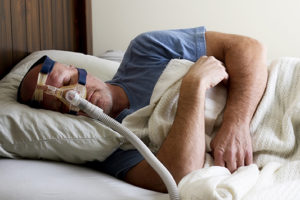Sleep Apnea and Heart Disease
A good night’s sleep restores energy, improves performance and generally makes you feel better.
Getting the right amount of sleep is also important for good heart health. A South Korean study of more than 47,000 adults found that people who sleep about seven hours a night have significantly fewer calcium deposits in their arteries. These deposits narrow blood vessels, stiffen artery walls and can lead to heart attack.
Too much sleep, it turns out, can be as bad for your heart health as too little. People who slept five or fewer hours per night or more than nine hours per night had poorer outcomes on indicators of heart health. And regardless of how many hours people slept, poor quality sleep had the same effect on people’s hearts—calcium deposits and stiffening of the arteries.
One of the major causes of poor sleep quality is sleep apnea. While it isn’t clear whether there is a causal relationship between sleep apnea and heart disease, the two conditions often coexist. For example, about 30% of people with obstructive sleep apnea (OSA) have high blood pressure, while about half of people with high blood pressure also have OSA.
People with OSA are also more likely to have problems with the rhythm of their hearts: a heart rate that is either too fast or too slow. For instance, people with severe OSA are four times more likely to have atrial fibrillation than those without sleep apnea. People with sleep apnea are more likely to have coronary artery disease, which can lead to heart attack. And sleep apnea also plays a role in heart failure. Untreated OSA can both lead to heart failure and make heart failure symptoms worse.

